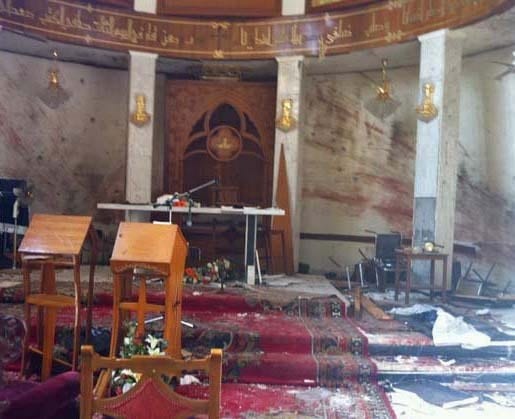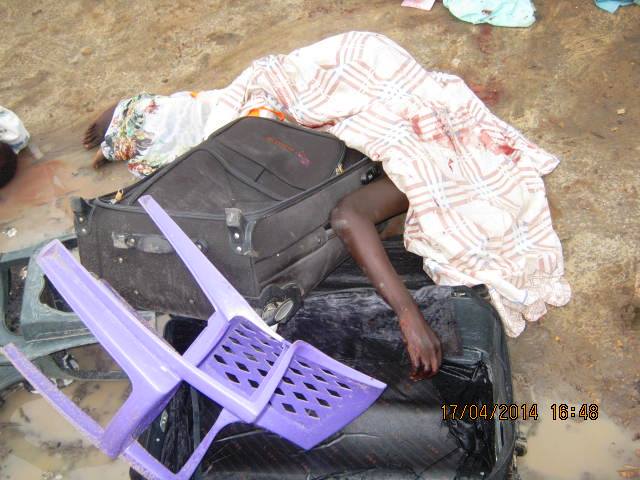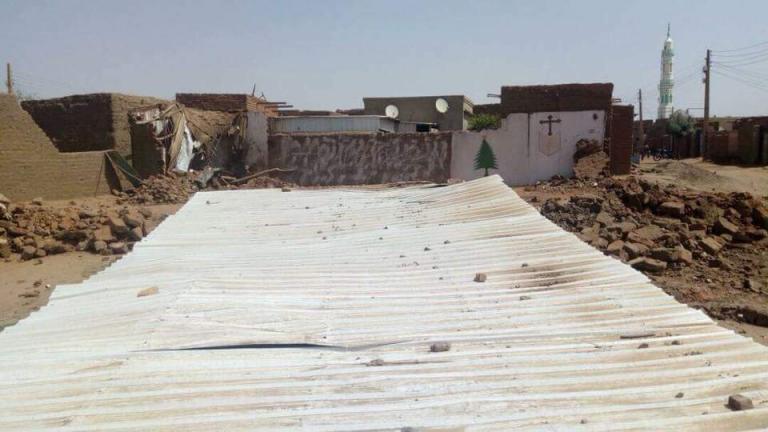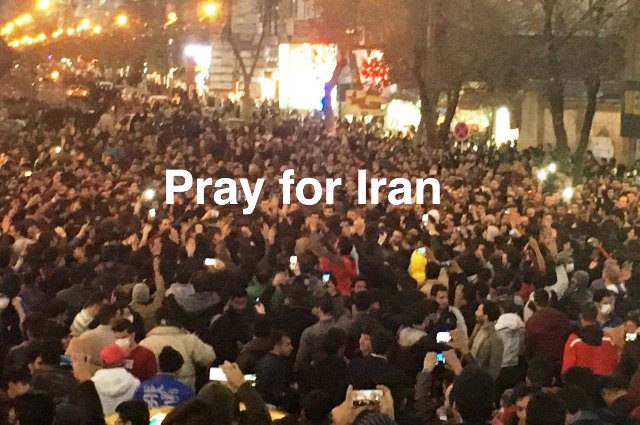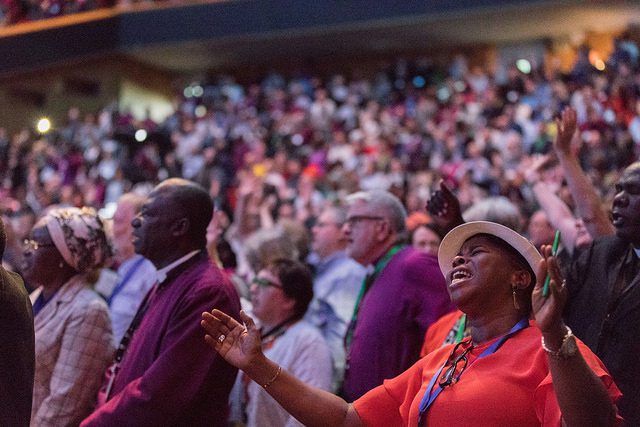
For a week in June we met as 2000 Anglican Christians from around the world at GAFCON 2018 in Jerusalem, the Global Anglican Future Conference. We worshipped, prayed, and discussed the way forward. We came as fellow believers who acknowledge the Lordship of Christ and honor the authority of Holy Scripture.
Our delegation from the United States and Canada was not too shabby in size! And Australia, New Zealand, South America — even Europe — were surprisingly well represented. But by far, the most delegates were from Africa. It seems certain that the future of Biblical Anglicanism depends upon provinces such as the Anglican Church of Nigeria. If the Anglican Church in Nigeria survives the war against its nation’s Christians, that is.
Christian Genocide in Nigeria?
At present, the future for all Christians in Nigeria looks grim:
- Nine of the country’s thirty-six states impose full-blown Sharia. This forces Christians in those states to navigate a minefield. In this minefield, Islamic rage could be detonated by anything as seemingly innocuous as a gesture, a word, or even an act of God. In one such incident, Muslims blamed Christians for a lunar eclipse and went on a killing spree.
- Then there is the murderous violence of Boko Haram. For years the U.S. State Department seemed determined to see Boko Haram as “disenfranchised, impoverished youth.” (Forget the fact that they were driving around the northern and middle belt states in fully-loaded SUVs, accompanied by their own chef.) Elites complained that they were just “in need of job counseling and midnight basketball.” But determined activists, of which I was one, finally broke through the false narrative. State designated Boko Haram a Foreign Terrorist Organization in November 2013.
- In more recent years, nomadic Fulani “herdsmen” have evolved into Fulani Jihadists. They target Christians, wiping out entire villages and grabbing the land. If Christians attempt to defend themselves, they are accused of “retaliating.” As one Nigerian Christian told a member of Congress, “We are told to ‘turn the other cheek,’ but we have no more cheeks left to turn.” The Fulani are now ranked above Boko Haram as deadliest terrorists. They murdered more people than Boko Haram in 2015, 2016, and 2017. And they are already on their way to beating their own record in 2018.
Faith and Peace
Still, at GAFCON it was obvious to me that the Nigerian archbishops, bishops, clergy, and lay delegates were full of the joy of the Lord. A 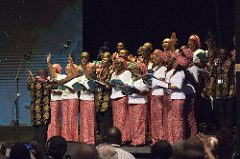 talented and powerful worship team from Nigeria had led our music all week long. I was happy to see Nigerian church leaders that I already knew. Among those were the Archbishop and Primate, the Most Reverend Nicholas Okoh. And there was Bishop Nathan Inyom, whose Diocese of Makurdi is a refuge for those fleeing from Fulani.
talented and powerful worship team from Nigeria had led our music all week long. I was happy to see Nigerian church leaders that I already knew. Among those were the Archbishop and Primate, the Most Reverend Nicholas Okoh. And there was Bishop Nathan Inyom, whose Diocese of Makurdi is a refuge for those fleeing from Fulani.
I also made a lot of new Nigerian friends. My daily morning small group included the Rt. Reverend Evans Ibeagha, the Bishop of the Diocese of Nike, and his sweet wife, Peace. (There was a lot of laughter by Mama Peace and me over the coincidence of Faith and Peace sitting side by side in the huge auditorium.)
Early in the week, Archbishop Okoh had addressed our gathering. Okoh, who is the current chairman of GAFCON, declared, “The authentic Gospel means we are no longer in charge because we have been bought with the blood of Jesus Christ.” And on this last day of the conference, GAFCON announced new leaders. My own Archbishop, the Most Reverend Foley Beach, would follow Archbishop Okoh as chairman. The Most Reverend Ben Kwashi, the Archbishop of Jos, would be the new Secretary General. Jos, in Plateau State, is at the center of much of the violence against Christians by Fulani.
Threats from Without
GAFCON that day also announced the final version of the conference statement, a “Letter to the Churches.” The letter explains the mission and ministry of GAFCON going forward after its first ten years. The letter concludes:
To proclaim the gospel, we must first defend the gospel against threats from without and within. We testify to the extraordinary blessings on this Conference, which leads us to call upon God even more, that the Anglican Communion may become a mighty instrument in the hand of God for the salvation of the world. We invite all faithful Anglicans to join us in this great enterprise of proclaiming Christ faithfully to the nations.
We all burst into applause at the end of the letter. And then we burst into song, joyfully, but reverently singing “It is Well With My Soul.” The Nigerians, spread throughout the vast crowd, were among the first to their feet, hands raised upwards, as we sang:
When peace like a river attendeth my way,
When sorrows like sea billows roll,
Whatever my lot, Thou hast taught me to say,
“It is well, it is well with my soul.”
Sorrows like sea billows are rolling over the Christians of Nigeria. It is in large part on behalf of Nigeria, but also relevant to numerous other provinces, that the Letter to the Churches included the admission, “Militant forms of religion and secularism are hostile to the preaching of Christ and persecute his people.” That is putting it mildly! But some Christians — usually the ones not experiencing the persecution — still believe that reticence about the source of the persecution is best.
Strength to the Persecuted
The letter promises, “We commit to encouraging each other to give strength to the persecuted, a voice to the voiceless, advocacy for the oppressed, protection of the vulnerable. . .” Sadly, there will be plenty of opportunities to give strength to the persecuted.
It was shocking, but not surprising, to hear that Fulani had killed as many as 200 men, women, and children in Archbishop Kwashi’s province of Jos, even as we were meeting. The slaughter that spread throughout dozens of villages had started on Thursday, June 22, and continued unabated until Sunday night, the 24th:
Though Satan should buffet, though trials should come,
Let this blest assurance control,
That Christ hath regarded my helpless estate,
And hath shed His own blood for my soul.
Since that horrific attack there have been more attacks on Christians almost every day. In some cases, the Nigerian police and/or military collaborate with attackers, or at least delay coming to the scene until the attack has been completed. And the Fulani are acting with impunity. Rather than holding them unconditionally accountable, Nigerian President Buhari and others have framed their attacks on defenseless communities as “clashes” between farmers and “herdsmen.”
The Future of Nigerian Christians?
Now the residents of Plateau State, including the Christians, are demanding that President Buhari cease equivocating and act to protect the Christians. Recently the Christian Association of Nigeria (CAN) released a statement noting that with the most recent slaughter, the death toll for 2018 alone is up to 6000 people. The statement warned, “There is no doubt that the sole purpose of these attacks is aimed at ethnic cleansing, land grabbing and forceful ejection of the Christian natives from their ancestral land and heritage.”
What should Western Christians be doing? All Western Christians are accountable for their response to this slaughter of their brothers and sisters in Nigeria, but particularly American Anglicans — who found theological and spiritual shelter in the Church of Nigeria. Pray. Counter the lie of moral equivalence that “both sides” are to blame. Urge your members of Congress and the State Department to put pressure on the Nigerian government to protect the Christians, to find out who is funding the transformation of the Fulani into full-fledged jihadis, and to place the blame where it belongs and not succumb to political correctness.
In spite of great sorrow and persecution, the Nigerian Christians are a witness to the world of their faith in the goodness of God and the resurrection power of Jesus Christ. They can sing “it is well with my soul.” If Western Christians stand idly by or equivocate about blame while their fellow believers are being slaughtered, this is a song they cannot sing.


